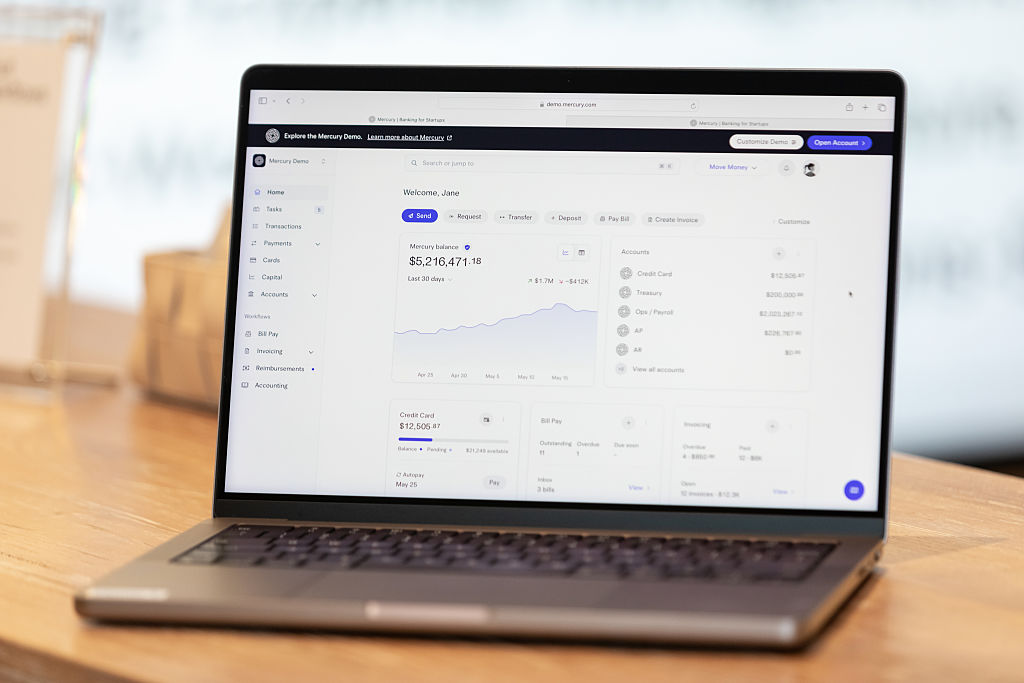Is It Worth Getting a Business Bank Account for Your Small Business?
If you’re using your personal bank account for your business, it’s time to switch. Here are the legal and logistical reasons why you need a separate business bank account.


Profit and prosper with the best of Kiplinger's advice on investing, taxes, retirement, personal finance and much more. Delivered daily. Enter your email in the box and click Sign Me Up.
You are now subscribed
Your newsletter sign-up was successful
Want to add more newsletters?

Delivered daily
Kiplinger Today
Profit and prosper with the best of Kiplinger's advice on investing, taxes, retirement, personal finance and much more delivered daily. Smart money moves start here.

Sent five days a week
Kiplinger A Step Ahead
Get practical help to make better financial decisions in your everyday life, from spending to savings on top deals.

Delivered daily
Kiplinger Closing Bell
Get today's biggest financial and investing headlines delivered to your inbox every day the U.S. stock market is open.

Sent twice a week
Kiplinger Adviser Intel
Financial pros across the country share best practices and fresh tactics to preserve and grow your wealth.

Delivered weekly
Kiplinger Tax Tips
Trim your federal and state tax bills with practical tax-planning and tax-cutting strategies.

Sent twice a week
Kiplinger Retirement Tips
Your twice-a-week guide to planning and enjoying a financially secure and richly rewarding retirement

Sent bimonthly.
Kiplinger Adviser Angle
Insights for advisers, wealth managers and other financial professionals.

Sent twice a week
Kiplinger Investing Weekly
Your twice-a-week roundup of promising stocks, funds, companies and industries you should consider, ones you should avoid, and why.

Sent weekly for six weeks
Kiplinger Invest for Retirement
Your step-by-step six-part series on how to invest for retirement, from devising a successful strategy to exactly which investments to choose.
You might think your side business is too small to warrant having a separate business bank account. Maybe you’re just starting out and it feels too soon to bother juggling multiple accounts. Maybe you’ve been freelancing for years and never even thought about separating business finances from your personal ones.
For many small businesses, however, a separate business bank account is required to maintain certain legal safeguards and avoid unexpected account closures. But even business owners who don’t need one for legal reasons can still benefit from having a checking account that was actually built for business.
With a business checking account provided through the fintech company, Mercury, for example, the added tools and features make it feel more like banking and financial planning software rolled up into one convenient platform. Keep reading to find out which business owners need a business account, how it differs from a personal account, and what you’ll need to set one up.
From just $107.88 $24.99 for Kiplinger Personal Finance
Become a smarter, better informed investor. Subscribe from just $107.88 $24.99, plus get up to 4 Special Issues

Sign up for Kiplinger’s Free Newsletters
Profit and prosper with the best of expert advice on investing, taxes, retirement, personal finance and more - straight to your e-mail.
Profit and prosper with the best of expert advice - straight to your e-mail.
Compare Mercury business accounts and find the right price and features for your small business.
Do you need a business bank account for your small business?
Whether your business is made up of just yourself or has hundreds of employees, you probably need a business account. If you have an LLC or you incorporated your business, for example, you are required to have one to maintain the legal safeguards that come with that status.
If you don’t separate your personal account from your business account, your creditors could have grounds to hold you personally liable for your company’s debt.
Depending on which institution you use for personal checking, you may not be allowed to use your existing checking account for business, no matter what type of business you have.
With that said there are some situations where you aren’t required to open a separate business account. Many sole proprietors or freelancers, for example, can technically use a personal account, provided the deposit agreement doesn’t say anything about not using it for business purposes.
Whether you’re legally required to open a business account or not, there are plenty of ways that having one can make running your business easier. To start, maintaining separate accounts just makes it a lot easier to keep track of your business income and expenses. That’s handy for budgeting and accounting purposes, but also makes it a lot easier to accurately file your taxes come tax season.
Having a business account can also make it easier to apply for business loans. Not only does it add legitimacy to your company, but it also makes it easy to provide bank statements that only show business-related revenue and expenses.
What’s the difference between a business checking account and a personal one?

A business and personal checking account look similar at first glance. Both allow you to make deposits and spend your money using a debit card, writing checks or by making certain types of transfers. Both also may come with FDIC insurance protecting deposits up to $250,000.
In addition to those standard features of a checking account, business accounts often come with a few extra features like the ability to accept credit card payments and seamless integrations with accounting and tax prep software to make managing your business finances and tax planning easier.
Many also allow you to add users to your account while also limiting their access and spending. Unlike adding a joint accountholder to your personal account who will then have all the same permissions as you, a business account allows you to tailor specified roles and spending controls for each user.
Mercury Account Features for Your Small Business

As an example of how an actual business bank account can do more than a standard personal bank account, take a look at accounts provided through Mercury. The fintech company partners with FDIC-insured banks to provide a range of online banking services tailored to business of all sizes.
That includes the Mercury, Mercury Plus and Mercury Pro accounts. With no monthly fees or minimum balance requirements, the standard Mercury account is a great entry-level account for new or small businesses that need the added financial planning tools of a business account without the added cost usually associated with them. As your business grows, you can upgrade to Mercury Plus (which comes with a $35 monthly fee) or Mercury Pro (for a $350 monthly fee).
Here’s a quick look at some of the Mercury business banking features that go beyond a standard checking account:
- Accept payments via credit card, Apple Pay and Google Pay.
- Generate invoices directly from your account. With Mercury Plus or Pro, you can even set up recurring invoices and payment reminders.
- Automatically match payments you receive to invoices so you can easily keep track of paid and outstanding invoices.
- Issue corporate cards to your employees, with tailored permissions for each one. That includes making the cards only usable for payments to specific merchants as well as setting custom spending limits and authorization requirements. You’ll also be able to set company-wide spending rules that apply to all account users.
- Reimburse expenses for up to five users per month on the entry-level account. With Mercury Plus, that increases to 20 users per month and you can add additional users for $5 per user per month. With Mercury Pro, you get up to 250 users per month.
- Automatically spot duplicate subscriptions so you can curb unnecessary spending.
- Issue cash back credit cards that earn 1.5% cash back on every transaction, while still leveraging the control over spending limits and transaction types on those company credit cards.
- Sync your account to third-party business tools like QuickBooks, Xero, Stripe, Slack and more.
- Create your own rules for coding transactions and expenses to easily manage cash flow through your account.
How to open a business account
Opening a business account requires a bit more documentation than you’d need for a personal account. But the process is still easy and decisions are typically made in one to two business days, so you’ll have your account up and running quickly.
Here are the key requirements you’ll need to have on hand when you apply for a business account:
- Official company formation documents
- IRS-Issued Employer Identification Number document
- Copy of government-issued ID for each founder or majority owner
- A physical address for your business. This can be a residential address, as long as it is the primary location you do business out of.
- Your legal business name
- A description of your industry and what your business does
- Your company’s source of funds
- Details about current and future operations
Bottom line
A business account is required for many types of business, regardless of size. But even if you’re a sole proprietor or freelancer, the added tools that usually come with a business account like the ones offered through Mercury make it worthwhile even if you aren’t legally required to have one.
*Mercury is a financial technology company, not a bank. Banking services provided through Choice Financial Group, Column N.A., and Evolve Bank & Trust; Members FDIC.
**The IO Card is issued by Patriot Bank, Member FDIC, pursuant to a license from Mastercard®. To receive cash back, your Mercury accounts must be open and in good standing, meaning they cannot be suspended, restricted, past due, or otherwise in default.
Related content
Profit and prosper with the best of Kiplinger's advice on investing, taxes, retirement, personal finance and much more. Delivered daily. Enter your email in the box and click Sign Me Up.

Rachael Green is a personal finance eCommerce writer specializing in insurance, travel, and credit cards. Before joining Kiplinger in 2025, she wrote blogs and whitepapers for financial advisors and reported on everything from the latest business news and investing trends to the best shopping deals. Her bylines have appeared in Benzinga, CBS News, Travel + Leisure, Bustle, and numerous other publications. A former digital nomad, Rachael lived in Lund, Vienna, and New York before settling down in Atlanta. She’s eager to share her tips for finding the best travel deals and navigating the logistics of managing money while living abroad. When she’s not researching the latest insurance trends or sharing the best credit card reward hacks, Rachael can be found traveling or working in her garden.
-
 Quiz: Do You Know How to Avoid the "Medigap Trap?"
Quiz: Do You Know How to Avoid the "Medigap Trap?"Quiz Test your basic knowledge of the "Medigap Trap" in our quick quiz.
-
 5 Top Tax-Efficient Mutual Funds for Smarter Investing
5 Top Tax-Efficient Mutual Funds for Smarter InvestingMutual funds are many things, but "tax-friendly" usually isn't one of them. These are the exceptions.
-
 AI Sparks Existential Crisis for Software Stocks
AI Sparks Existential Crisis for Software StocksThe Kiplinger Letter Fears that SaaS subscription software could be rendered obsolete by artificial intelligence make investors jittery.
